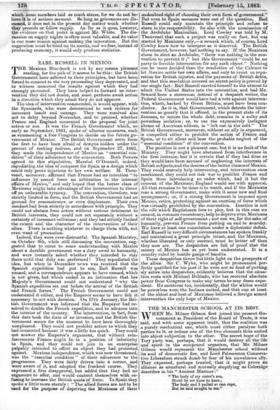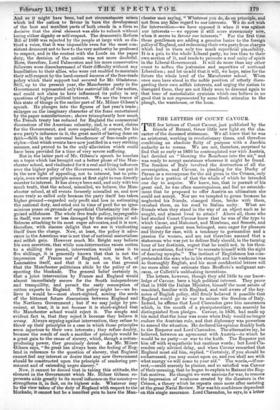THE MANCHESTER SCHOOL AT ITS BEST.
WHEN Mr. Milner Gibson first joined the present Go- vernment as President of the Board of Trade, it was said, and with some apparent truth, that the coalition was a purely mechanical one, which must either paralyze both parties to it, or reduce one of the two elements thus united into abject subjection to the other. The secret hope of the Tory party was, perhaps, that it would destroy all the life and spirit in the compound organism, that Mr. Milner Gibson would represent the Manchester school without its soul of democratic fire, and Lord Palmerston Conserva- tive Liberalism struck dumb by fear of his unwelcome ally. They expected, perhaps trusted, that it might prove an alliance as unnatural and mutually stupifying as Coleridge describes in his "Ancient Mariner :" "The body of my sister's son, Stood by me knee to knee; The body and I pulled at one rope, But he said nought to me." And so it might have been, had not circumstances arisen which led the nation to favour in turn the development of the best and manliest parts of both creeds in a form so decisive that the rival element was able to submit without losing either dignity or self-respect. The democratic Reform Bill of 1860 was rejected by the people at large with so dis- tinet a voice, that it was impossible even for the most con- sistent democrat not to bow to the very authority he professed to respect, and in the contest with the Lords on the paper duty, the decision of the nation was not more doubtful. Here, therefore, Lord Palmerston and his more conservative followers were disembarrassed of their difficulty without any humiliation to their allies, who were yet enabled to maintain their self-respect by the hard-earned success of the free-trade policy which their support had secured for Mr. Gladstone. Still, up to the present year, the Manchester party in the Government represented only the material life of the nation, slid could not claim to have influenced its policy in any questions of higher political interest. We see the traces of this state of things in the earlier part of Mr. Milner Gibson's speech. He plunges into the figures of last year's trade ; enlarges on the imaginary character of the fears entertained by the paper manufacturers ; shows triumphantly how much, the French treaty has reduced for England the commercial " dimensions of the American calamity, and, in a word, claims for the Government, and more especially, of course, for his own party's influence in it, the great merit of having done on faith—faith in the universal beneficence of free-trade prin- ciples—that which events have now justified in a very striking manner, and proved to be the only alleviation which could have been provided for a time of very severe suffering. But in the latter part of Mr. Gibson's speech he touches on a topic which has brought out a better phase of the Man- chester school, and vindicated for it a real and living influence over the higher policy of the Government ; which has put it in the new light of appealing, not to interest, but to prin- ciple, even where principle seems at first sight to run directly counter to interest. It has always been said, and only with too much truth, that the school, miscalled, we believe, the Man- chester school, at all events formerly miscalled so, and now more truly so called only because the party itself has taken higher ground—regarded only profit and loss in estimating the national duty, and cried out in time of peril for an igno- minious peace on grounds of superficial Christianity but dis- guised selfishness. The whole free trade policy, impregnable in itself, was more or less damaged by the suspicion of sel- Isliness attaching to its most eager advocates, and it is now, therefore, with sincere delight that we see it vindicating itself from the charge. Now, at least, the policy it advo- cates in the American war is not that of national materialism and selfish gain. However much Mr. Bright may believe his own assertion, that while non-intervention raises cotton to a shilling the pound, intervention would raise it to five shillings, it is generally known that that is not the impression of France nor of England, nor, in fact, of Lancashire itself, and that it is not on that ground that the Manchester politicians abide by the policy of re- specting the blockade. The general belief certainly is, that a joint intervention by France and England would almost immediately secure for the South independence and tranquillity, and permit the early resumption of cotton exports to England. The policy might be—we be- lieve it would be—most short-sighted, sowing the seeds of the bitterest future dissensions between England and the Northern Government ; but if we may judge by pre- cedent, at least, it is not because it is short-sighted that the Manchester school would reject it. The simple and evident fact is, that they reject it because they believe it wrong. Always arguing against intervention, they refuse to throw up their principles in a case in which those principles seem injurious to their own interests ; they refuse doubly, because the result of such a sacrifice of principle would be a great gain to the cause of slavery, which, though a cotton- producing power, they genuinely detest. As Mr. Milner Gibson says, "So great has always been the feeling of Eng- land in reference to the question of slavery, that England cannot feel any interest or desire that any new Government should be constructed upon the principle of rendering per- manent and of extending negro slavery." Now, it cannot be denied that in taking this attitude, the element in the Government which Mr. Milner Gibson re- presents adds greatly to its moral influence on the country— strengthens it, in fact, on its highest side. Whatever may be the view taken of the duty of England with respect to the blockade, it cannot but be a manifest gain to have the Man- cheater men saying, "Whatever you do, do on principle, and not from any false regard to our interests. We do not wish for intervention—we have opposed it when it was against our interests — we oppose it .still more strenuously now, when it seems to favour our interests." For the first time these gentlemen are adding a genuine lustre to the foreign policy of England, and redeeming their own party from charges which bad in them only too much superficial plausibility. It is a gain to the whole Liberal party, no less than to their own section of it, and tends to promote a real unity of spirit in the Liberal Government. It will do more than any other event to soften the jealousies and asperities of sectional Liberalism ; and let us add that it will, we hope, raise for the future the whole level of the Manchester school. When once men have stood in the noble position of utterly disre- garding their own selfish interests, and urging the nation to disregard them, they are not likely soon to descend again to that tone of materialistic cynicism which can believe in no good that is not represented by some fresh stimulus to the plough, the warehouse, or the loom.































 Previous page
Previous page